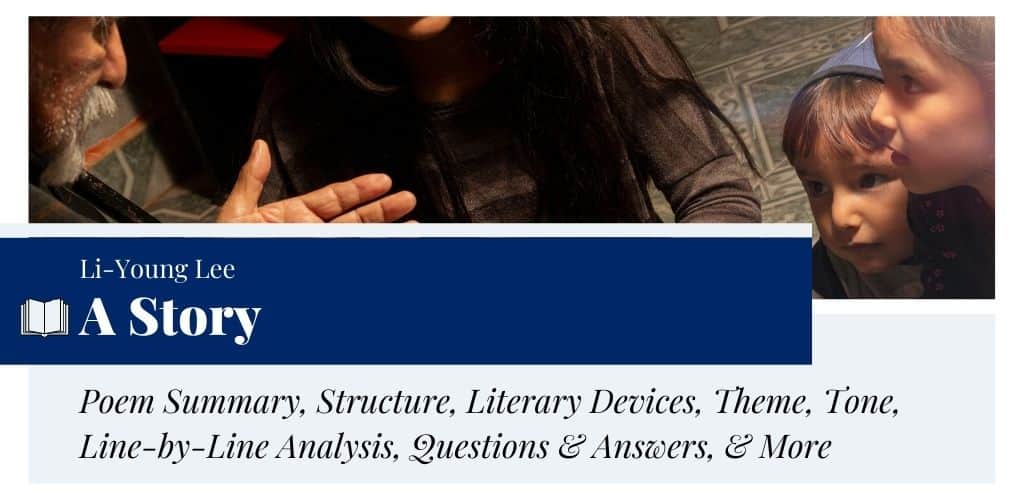A Story by Li-Young Lee
“A Story” by Li-Young Lee was originally published in The City in Which I Love You (1990). This poem is about a father’s inability to come up with a “new story.” The son’s humble prayer alerts the man of the future of their relationship. One day, the bored son will pack his belongings and go away to find better, “new” stories his father could not tell. He will no longer be in his father’s laps, nodding and being happy with the same old fables of morality. In this way, Lee features the irony of human relationships through the story of a father and son.
- Read the full poem “A Story” below:
A Story by Li-Young Lee Sad is the man who is asked for a story and can't come up with one. His five-year-old son waits in his lap. Not the same story, Baba. A new one. The man rubs his chin, scratches his ear. In a room full of books in a world of stories, he can recall not one, and soon, he thinks, the boy will give up on his father. Already the man lives far ahead, he sees the day this boy will go. Don't go! Hear the alligator story! The angel story once more! You love the spider story. You laugh at the spider. Let me tell it! But the boy is packing his shirts, he is looking for his keys. Are you a god, the man screams, that I sit mute before you? Am I a god that I should never disappoint? But the boy is here. Please, Baba, a story? It is an emotional rather than logical equation, an earthly rather than heavenly one, which posits that a boy's supplications and a father's love add up to silence. - from The City in Which I Love You (1990)

Summary
Lee’s poem “A Story” is about a father who is unable to tell a new story at his son’s request. He feels sad and thoughtful. He rubs his chin and scratches his ear in confusion and agony. The fact that pains him deeply is that he cannot recall one new story. Thus, one day, he thinks, the son will give up on him and leave him all alone. Then he will not wait to listen to the alligator, angel, or spider stories of his father. At last, reverting from future speculations, the narrator describes how the father’s love and the boy’s supplications add up to a prolonged silence.
Structure, Form, & Diction
“A Story” is a free-verse narrative poem, consisting of six stanzas. The line count ranges between two to six. There is no regular rhyme or meter in the poem. It has a conversation flow. Lee writes this poem from the point of view of a third-person, omniscient speaker narrating the story of the father and son. The diction of the poem is clever, simple, and symbolic. Lee begins the poem in the manner of a thesis. He produces an argument at the beginning. Then he elucidates the statement. Finally, he postulates how sadness results in silence. Besides, he uses the characters’ statements in italics in order to differentiate the speaker’s narration from theirs.
Literary Devices & Figurative Language
Lee makes use of the following literary devices in “A Story” in order to make this piece more appealing to readers.
Metaphor
There is a metaphor in the lines “In a room full of books in a world/ of stories”. Here, the library, the room filled with books, is compared to a “world” of multifarious stories. In the last stanza, drawing on the statement in the first couplet, Lee metaphorically says, it is an “emotional,” and “earthly” equation. It seems as if he is drawing a logical deduction of the father-son relationship.
Enjambment
It is one of the important devices used in a number of instances. It occurs in the first, third, fourth, and sixth stanzas. For example, readers can see how the lines of the third stanza spill onto the next in order to form a complete idea:
In a room full of books in a world
of stories, he can recall
not one, and soon, he thinks, the boy
will give up on his father.
Foreshadowing
The father anticipates how the son will leave him in the future in the fourth and fifth stanzas. He thinks then the son will not listen to his old stories and will pack his belongings in search of new ones in the real world:
… Don’t go!
Hear the alligator story! The angel story once more!
…
But the boy is packing his shirts,
he is looking for his keys.
Rhetorical Exclamation
This device is used in succession in the second and third lines of the fourth stanza. The father screams in love, “Don’t go!” The following exclamations reveal his desperation to stop his son from going away.
Rhetorical Question
Lee uses rhetorical questions or interrogations in the fifth stanza:
Are you a god,
the man screams, that I sit mute before you?
Am I a god that I should never disappoint?
Antithesis
In the last stanza of “A Story,” Lee uses antithesis. He refers to the father’s sadness caused by his inability to tell a new story as an “emotional rather than logical equation.” Using another antithesis, the narrator says, it is “an earthly rather than heavenly one”.
Symbolism
The main symbol of the poem is the “story.” It stands for the binding factor of humanity, the thread stringing the father and son. Besides, the “alligator” and “angel” (in the fourth stanza) represent two aspects of creation: experience and innocence. The “spider” somehow symbolizes the father, trying to web his son in his same old stories. Indeed, the son will laugh at the “spider” someday.
Imagery
Lee uses tactile imagery in the line “The man rubs his chin, scratches his ear.” In the next stanza, he uses visual imagery to describe the room. Besides, the poet uses organic imagery in order to convey the inner feelings of the father, such as in the lines, “Are you a god,/ the man screams, that I sit mute before you?”
Line-by-Line Analysis & Explanation
Lines 1-5
Sad is the man who is asked for a story
and can’t come up with one.
…
His five-year-old son waits in his lap.
Not the same story, Baba. A new one.
The man rubs his chin, scratches his ear.
Li-Young Lee’s narrative poem “A Story” begins in the manner of a logical “equation.” The narrator posits a statement: the man, who cannot come up with a story he is asked for, is sad. Then he starts building the narrative around this statement. He presents the story of a father and son.
There is a man and his five-year-old son waiting on his lap. The son is bored listening to the same, old stories his father narrates. Now, he wants something new, not the same story. Humbly addressing his father “Baba,” he implores him to tell a new one. Baba is a familiar form of address to one’s father in Asian countries. From the use of the term, it can be assumed that the poet is sharing his own story. His sons also ask him to tell stories and nag to hear new ones as he told at a reading of the poem.
The father in the poem cannot come up with a new story on his son’s devoted request. Therefore, he feels confused and frustrated, inferred from his gestures of rubbing the chin and scratching the ear.
Lines 6-14
In a room full of books in a world
of stories, he can recall
not one, and soon, he thinks, the boy
will give up on his father.
…
Already the man lives far ahead, he sees
the day this boy will go. Don’t go!
Hear the alligator story! The angel story once more!
You love the spider story. You laugh at the spider.
Let me tell it!
In the third stanza of “A Story,” the narrator describes the room. It is full of books. So, the room is a world of stories in itself, yet the father cannot recall a single, “new” story. Isn’t it frustrating? However, the father thinks about something else rather than his shortcomings as a storyteller. He is of the view that at some point his son is going to give up on him. It is natural and the eternal irony of human relationships.
The man lives far ahead in his thoughts. As one’s son grows up, a father needs to think about his future. The chain of thoughts is not always that satisfying due to the presence of the harsh realities of relationships. He is sure one day his son will go. No matter how badly the father needs his son or how affectionately he requests him to stay a bit longer to listen to the old stories, the son will go out of his clutches seeking newer stories in the real world.
Then, his old alligator stories or the angel stories cannot stop him from going. Even if he starts telling the spider story his son was once fond of, he will not stop by. The desperation and agony in the father’s voice can be felt through the repetition of consecutive rhetorical exclamations.
Lines 15-23
But the boy is packing his shirts,
he is looking for his keys. Are you a god,
the man screams, that I sit mute before you?
Am I a god that I should never disappoint?
…
But the boy is here. Please, Baba, a story?
It is an emotional rather than logical equation,
an earthly rather than heavenly one,
which posits that a boy’s supplications
and a father’s love add up to silence.
In the fifth stanza, the narrator describes how the son will pack his belongings and look for his keys in order to go out. This time the father’s desperation will turn into dim anger. The man believes he is not a god, nor his son. So, how can he be a mute listener in the event of his son’s departure? Is he a god, who never disappoints? He is just a father, a human being, who loves his son. When he grows older, he will need his son by his side more than he needs him now.
In the last stanza, the narrator returns to the present moment, where the son requests his father to tell him a story. He is still “here.” The following lines refer back to the opening statement: “Sad is the man who is asked for a story/ and can’t come up with one.” According to the speaker, the statement is an emotional rather than logical one. It revolves around the earthly relationship of a father and son, not the eternal relationship of the divine father and humankind (His children).
Therefore, this situation leads the father to no special discovery. The boy’s humble prayers and the father’s love results in nothing other than a lasting “silence.” This silence is not an outcome of some limitation only. It germinates from the ramification of the father-son relationship.
Theme
The theme of “A Story” by Li-Young Lee is the irony of the father-son relationship. This poem also explores the theme of a father’s unending love for his son, his speculations about the future, and his sadness resulting from the possible strain in their relationship. Through this poem, Lee tries to revisit the days when his father used to tell him stories just like his own son does. As a father, he is also nagged to tell new ones. However, when the father fails to come up with one, he thinks, at some point his son will give up on him. Being a father himself, Lee realizes the pain caused by this mere thought.
Tone
The overall tone of the poem “A Story” is sad, emotive, and worried. Lee purposefully uses the third-person point of view in order to distance himself from the subjective aspect of the story told in this piece. He wants to see the situation as it is. However, he also uses a subjective tone by presenting direct statements of the father and son in italics. This fusion of objective and personal tones makes the poem more interesting to read. As the speaker narrates the story, he uses a matter-of-fact tone. In the father’s voice, readers can sense pain, sadness, and apprehension. Whereas, the son’s requests reveal eagerness, love, and curiosity.
Historical Context
“A Story” was first published in Li-Young Lee’s second poetry collection The City in Which I Love You (1990). The collection won high praise and the Lamont Poetry Selection (now known as the Laughlin Award). In this piece, Lee remembers his childhood and his father, by weaving a remarkable web of memory and experience. Lee’s poems explore the themes of family history, childhood, and the father-son relationship. Likewise, in “A Story,” Lee shares a simple father-son story, tinged with his personal account. At a reading of the poem, Lee shares how his sons ask him to tell stories and sometimes he runs out of them.
Questions & Answers
“A Story” by Li-Young Lee is a poem about a father, unable to recall one new story at his five-year-old son’s request. He feels sorry for himself thinking one day his son will go away seeking new things. Then he can no longer make him wait as he does now with his same, old stories. This poem explores the irony of the father-son relationship, with particular emphasis on the pain of losing something dear. Lee wrote another poem on a similar theme, “The Gift.”
Li-Young Lee’s poem “A Story” delves deeper into the nature of human relationships. In every relationship, there is a point when we have to say goodbye to our dear ones. In this poem, a father struggles with reality and will find himself unable to satisfy his son after a certain period. When the son grows up, he cannot make him stay by his side to hear the same stories. This pain not only makes him forget about the task beforehand (to satisfy his son with a new story) but also shushes his senses.
The theme of “A Story” is the irony of human relationships. It also includes the themes of the love between a father and son, pain of separation, reality, and sadness.
“A Story” is a free-verse narrative poem written from the perspective of a third-person speaker. The poem consists of six stanzas with the line count ranging between two to six.
The poem “A Story” is written in the third-person or omniscient point of view. The narrator is none other than the poet Li-Young Lee himself.
The important literary devices used in the poem include metaphor, foreshadowing, rhetorical exclamation, antithesis, symbolism, and imagery.
In this poem, Li-Young Lee explores the parent-child relationship, specifically the father-son relationship. The characters in the poem are a father and his five-year-old son.
One of the important literary techniques used in the poem is foreshadowing. Lee uses this device in anticipation of the probable events that will occur in the father’s life. One day, his son will leave him. No matter how hard he tries to stop him, he won’t. Now, the son nags to hear a new story. But, then he will not give him another chance. In this way, Lee explores the complexity of the father-son relationship through foreshadowing. Besides, he uses some rhetorical exclamations and questions in order to convey the father’s emotions and feelings.
In the poem, the speaker’s tone is sad, emotive, and worried.
Li-Young Lee’s poem “A Story” explores the irony of human relationships with particular emphasis on the theme of growing up. It could be a suitable statement, to begin with. Backed up by the poet’s idea, we can easily reach a logical conclusion. In order to enhance the arguments, Lee’s poems “The Gift” and “Eating Together” can be referred to.
Similar Poems about Relationships
- “The Writer” by Richard Wilbur — This poem explores a father’s apprehensions regarding his daughter’s future.
- “The Toys” by Coventry Patmore — In this poem, a father feels sad for rebuking his son and later repents what he has done.
- “The First Snowfall” by James Russell Lowell — This piece describes how the snowfall reminds a father of his dead child.
- “Grief Calls Us to the Things of This World” by Sherman Alexie — In this poem, a son is forgetful and feels agonized by his father’s recent demise.
Useful Resources
- Check out Breaking the Alabaster Jar: Conversations with Li-Young Lee (2006) — It’s a collection of the best interviews by Li-Young Lee, capturing the transition of a twenty-nine-year-old poet prodigy to a seasoned veteran in high demand across the US and abroad.
- The Poem Aloud — Listen to Li-Young Lee reading “A Story,” along with an interesting personal account.
- A Conversation of Poetry and Consciousness — In this interview, Lee talks about poetry, prayerful attitudes, and unconscious states, and reads some of his poems.
- About Li-Young Lee — Read about the poet’s life and works.



